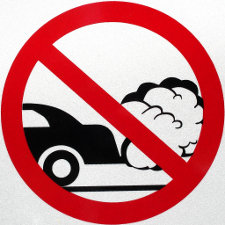By Stephen Vance, Staff
 At the next meeting of council, Meaford councillor Jaden Calvert will propose an idling control bylaw in hopes of eliminating unnecessary idling of cars in the municipality.
At the next meeting of council, Meaford councillor Jaden Calvert will propose an idling control bylaw in hopes of eliminating unnecessary idling of cars in the municipality.
“Emissions from fuel-powered internal combustion engines in vehicles emit greenhouse gases and air contaminants including carbon dioxide and volatile organic compounds that are harmful to the environment and our health and contribute to climate change,” said Councillor Calvert in an information sheet sent to local media.
Many municipalities across the province have adopted anti-idling bylaws to help reduce the amount of pollution created by vehicles.
“If we choose to use fuel-powered vehicles, we must do our part to use them wisely, which includes avoiding unnecessary idling. If we all do our part to avoid unnecessary idling, this will improve our air quality, our health and the health of the environment and save us money,” said Calvert.
Calvert also shared his thoughts on some common myths about vehicle idling:
Myth: The engine should be warmed up before driving.
Reality: Contrary to popular belief, excessive idling is not an effective way to warm up your vehicle, even in cold weather. The best way to warm it up is to drive it. In fact, with today’s computer-controlled engines, even on cold winter days no more than two to three minutes of idling is usually enough warm-up time before starting to drive. This also reduces fuel consumption and greenhouse gas emissions.
Myth: Idling is good for your engine.
Reality: Excessive idling can actually damage your engine components, including cylinders, spark plugs and exhaust systems.
Myth: Shutting off and restarting your vehicle is hard on the engine and uses more gas than if you leave it running.
Reality: Any more than ten seconds of idling uses more fuel than is required to restart the engine. However, the break-even time to offset any potential incremental maintenance costs to the starter or battery is under 60 seconds. So, as a guideline, if you’re stopped for more than 60 seconds – except in traffic or at a red light or if you are operating an emergency vehicle engaged in operational activities – turn off the engine.











